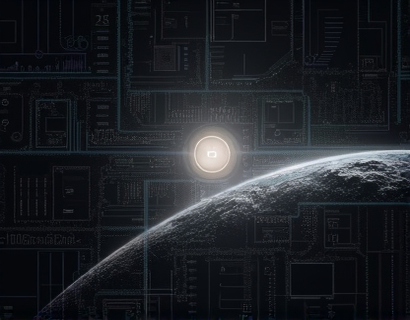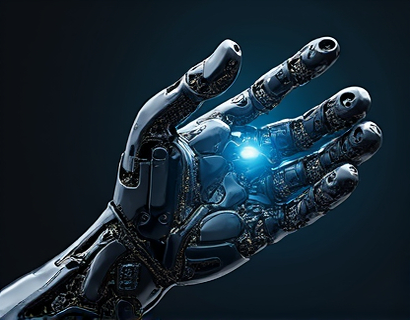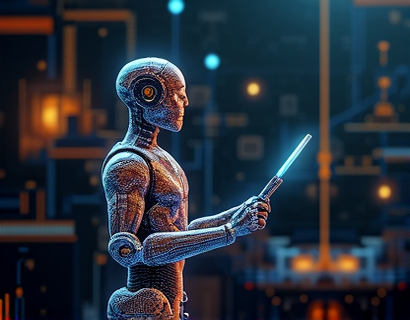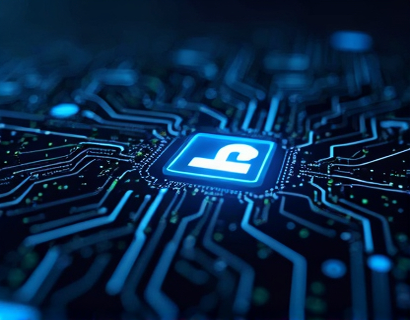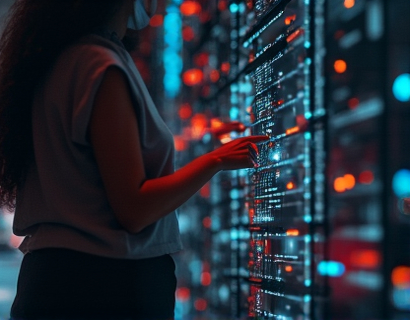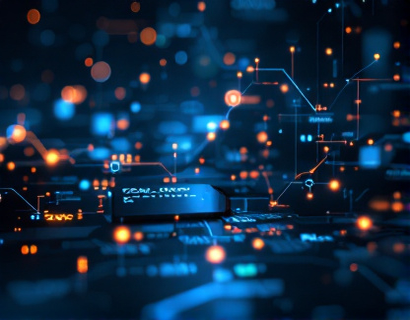Crypto and AI: Catalyzing Digital Transformation for Enhanced User Experiences
The integration of blockchain technology and artificial intelligence (AI) is ushering in a new era of digital transformation, fundamentally altering how we interact with online platforms and services. This synergy between crypto and AI is not just a technological curiosity but a powerful force driving innovation and enhancing user experiences across various industries. For tech innovators and early adopters, understanding this convergence is crucial for staying ahead in the rapidly evolving digital landscape.
The advent of blockchain technology has introduced decentralized, secure, and transparent systems that are redefining trust and reliability in digital transactions. Meanwhile, AI's capabilities in data analysis, pattern recognition, and predictive modeling are revolutionizing how businesses operate and engage with their users. When combined, these technologies create a potent toolset for building robust, intelligent, and user-centric digital ecosystems.
Blockchain: The Backbone of Trust and Security
Blockchain technology, at its core, is a distributed ledger that records transactions across multiple computers in such a way that the registered transactions cannot be altered retroactively. This inherent characteristic makes blockchain an ideal solution for ensuring data integrity and security. In the context of digital ecosystems, blockchain provides a foundation for trust, enabling peer-to-peer interactions without the need for intermediaries.
One of the most significant advantages of blockchain is its ability to facilitate transparent and tamper-proof transactions. This is particularly valuable in industries such as finance, supply chain, and healthcare, where data accuracy and security are paramount. By leveraging blockchain, digital platforms can offer users a higher level of confidence in the systems they interact with, reducing friction and enhancing overall user satisfaction.
AI: The Intelligence Driver
Artificial intelligence, on the other hand, brings a different set of capabilities to the table. AI's strength lies in its ability to process and analyze vast amounts of data, identify patterns, and make intelligent decisions. In digital ecosystems, AI can be used to personalize user experiences, optimize operations, and provide insights that drive business growth. Machine learning algorithms, natural language processing, and computer vision are just a few of the AI techniques that can be harnessed to create smarter, more responsive digital services.
For instance, AI-powered chatbots can provide 24/7 customer support, handling queries and resolving issues in real-time. Predictive analytics can help businesses anticipate user needs and preferences, enabling proactive engagement strategies. Additionally, AI-driven content generation can enhance the richness and relevance of digital content, keeping users engaged and informed.
Synergy Between Blockchain and AI
The true power of combining blockchain and AI emerges when these technologies work in concert. Blockchain's transparency and security provide a solid foundation, while AI's intelligence and adaptability enhance the functionality and user experience. This synergy can lead to the creation of decentralized applications (dApps) that are not only secure but also highly intelligent and user-friendly.
Consider a decentralized marketplace where AI algorithms manage inventory, match supply with demand, and optimize pricing in real-time, all while ensuring that transactions are recorded on a blockchain for transparency and immutability. Such a system would offer users a seamless, trustworthy, and efficient shopping experience, setting a new standard for online marketplaces.
Enhancing User Authentication and Identity Management
One of the key areas where blockchain and AI can make a significant impact is in user authentication and identity management. Traditional methods of verifying user identities are often cumbersome and vulnerable to fraud. By integrating blockchain for secure storage of identity data and AI for advanced biometric verification, digital platforms can offer a more secure and convenient authentication process.
For example, AI-driven facial recognition combined with blockchain-based identity wallets can provide a frictionless login experience while maintaining high security standards. Users can control their identity data, sharing only what is necessary with each service, thereby enhancing privacy and reducing the risk of identity theft.
Optimizing Content Delivery and Personalization
AI's ability to analyze user behavior and preferences can be complemented by blockchain's transparent data handling to create highly personalized digital experiences. By leveraging AI to curate content based on user interests and blockchain to ensure data integrity and user consent, platforms can deliver tailored content without compromising user privacy.
Moreover, blockchain can enable creators to monetize their content more effectively through tokenization, ensuring they receive fair compensation for their work. AI can further enhance this by recommending relevant content, fostering a more engaging and rewarding experience for both creators and consumers.
Improving Supply Chain Transparency and Efficiency
In the realm of supply chain management, the combination of blockchain and AI can lead to significant improvements in transparency, efficiency, and sustainability. Blockchain can provide an immutable record of every step in the supply chain, from production to delivery, ensuring that all parties have access to accurate and up-to-date information.
AI can analyze this data to identify bottlenecks, predict demand, and optimize logistics. For instance, AI algorithms can predict maintenance needs for transportation vehicles, reducing downtime and costs. Additionally, AI-driven analytics can help identify sustainable practices by optimizing resource usage and minimizing waste, aligning with the growing consumer demand for eco-friendly products and services.
Fostering Decentralized Finance (DeFi) and Smart Contracts
The finance sector is another area where the integration of blockchain and AI is transforming traditional models. Decentralized finance (DeFi) platforms leverage blockchain for secure, transparent, and accessible financial services, while AI can enhance these platforms by providing sophisticated risk management and investment strategies.
Smart contracts, self-executing contracts with the terms directly written into code, can be powered by AI to make more informed and dynamic decisions. For example, AI can analyze market conditions and automatically adjust the terms of a smart contract to optimize outcomes for all parties involved. This fusion of technologies can lead to more efficient, fair, and automated financial systems.
Challenges and Considerations
While the potential benefits of combining blockchain and AI are substantial, there are also challenges and considerations that must be addressed. Scalability remains a significant issue for blockchain technology, as many platforms struggle to handle high transaction volumes efficiently. AI models, particularly those requiring extensive training, can be resource-intensive, necessitating robust infrastructure and computational power.
Moreover, the regulatory landscape for both blockchain and AI is still evolving, and compliance is a critical concern for businesses operating in this space. Ensuring data privacy, security, and ethical use of AI are paramount to building trust and avoiding legal pitfalls.
Future Outlook
As blockchain and AI continue to mature, we can expect even more innovative applications and integrations. The development of more efficient blockchain protocols, advancements in AI algorithms, and the emergence of new use cases will further solidify the role of these technologies in digital transformation.
For tech innovators and early adopters, embracing this synergy offers a competitive edge and opens up new opportunities for growth and innovation. By staying informed and proactive, they can leverage the power of blockchain and AI to create compelling digital experiences that resonate with users in the digital age.



